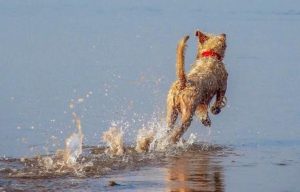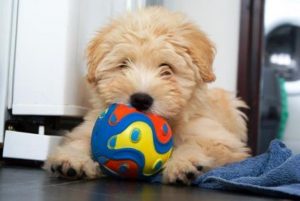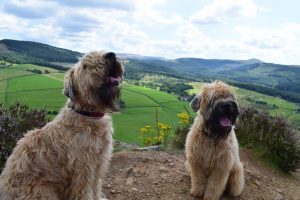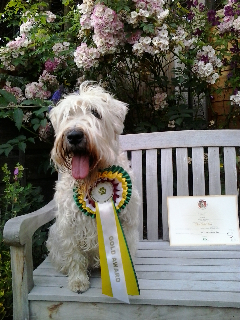Training
Obedience training with your dog.
Training with your puppy, or older dog, can take many forms. Sometimes it is for a specific activity, such as for Agility, or Ringcraft for showing your dog, but the most commonly considered “training” is for general obedience. It is likely to be the one type of training most pet owners will want to do, and it can be a good foundation for other activities that may follow.

The following sections on this page will give you an idea of why training is important, how to find and what you should look for in a good training class, training tips, and a section on the Kennel Club’s Good Citizen Scheme. Scroll down for more information.
Why do Obedience training with your puppy or dog?
Apart from the fact training can be fun for both the dog and the owner, it also helps to build a strong bond and relationship between them.
A well-trained dog is one that is more acceptable in the community in which it lives, which means you are more likely to be able to take your dog with you where ever you go, as it will be well behaved and not be a nuisance to other people or dogs.
Training should start from an early age. The sooner the better. You can start with some basic steps such as sit, down and recall (come), as soon as you get your puppy home, and before they are even able to get out and about. It means that moving on to training classes, once the puppy is vaccinated and able to go outside, is an easier step-up to take for both owner and puppy.

Training is a good idea no matter how old the dog is, and it is never too late to learn. Training classes are available to suit all ages and experience, of both dogs and owners.
Owners have a responsibility to ensure their dog is safe around other people and other dogs. Unfortunately, we now live in a society now where more and more legislation is being introduced, and dog behaviour and control is no exception to this.
Training classes provide a safe environment where the skills and techniques can be learned, so that both dog and owner meet their moral and legal responsibilities in terms of behaviour and control, as well as helping owners understand what their obligations are.
How to find a suitable dog training class for you and your dog?
Ask! You may have friends with dogs that go to dog training classes they can recommend to you, or your vet may be to recommend a class for you. Personal recommendation is no bad thing.
Alternatively, there are many websites, such as those listed below, who can help you find a trainer and a training class local to you.
* The Kennel Club ( www.thekennelclub.org.uk ) who have a “Find A Dog Cub” facility, as well as a list of Dog Training Clubs that work towards the various levels of the Kennel Club’s Good Citizen Dog Scheme. These provide training for puppies and dogs of all ages
* The Association of Pet Dog Trainers (www.apdt.co.uk ) have a list of their members around the UK, all of whom have been assessed by the Association before becoming members. These trainers usually have training classes for puppies and dogs of all ages.
* Gwen Bailey’s Puppy School (www.puppyschool.co.uk ) have training classes around the UK whose trainers offer training for puppies, with training classes starting for puppies usually aged between 12 and 20 weeks.
There are many other individual training groups to these.
Do your research first before deciding.
Before enrolling with a particular Club or Class, always ask to go along, without your puppy or dog, and watch what they do. This will give you the chance to make sure you are comfortable with the environment, the trainer, and the other ‘students’ and their dogs. A trainer should always be happy to let you do this. Speak to the other owners and see if they enjoy the classes and are willing to recommend them to you.
Not every class will suit every owner or dog. If you don’t feel comfortable, walk away and look for an alternative. The right class will be there for you.
What to look for in a good dog training class.
* It should be welcoming and friendly.
* The trainer should be approachable and offer encouragement. They should be willing, and able, to answer questions, and offer help and advice to correct any issues as they occur.
* Make sure you feel that the environment is safe and secure for everyone and their dogs.
* Are the dogs focussed on the training and their owners, as they should be, rather than the other dogs?
* Is everyone receiving equal help and advice from the trainer, when it is needed?
* The training should be rewards based training, using treats or toys to reinforce correct behaviours.

A good training class is not about them training your puppy or dog for you.
It is about them training you to train your dog.
Top tips on training
* Consistency – use the same command for each behaviour type, e.g. SIT, DOWN, COME etc., to avoid confusing your dog, and this should apply to everyone who trains or handles with your dog.
* Use the dog’s name before the command. It will help them to get used to their name and will also attract their attention, so they know to listen to you. Make sure everyone uses the same call name for your dog. It is no good you calling him Benji, when your partner calls him Benny, and the children call him Ben-Ben. The name you use, like the commands you give, need to be consistent to avoid confusing the dog.
* Set the boundaries and stick to them. For example, if you decide the dog is not coming up on the sofa, then make sure no one lets him get on the sofa.
* Be patient! Remember the puppy or dog hasn’t read the training manual! He needs you to be patient and help him learn.
* Train for short spells and on a regular daily basis, in addition to your training classes. This will help to reinforce what you have both learnt in class.
* Use praise and rewards, and remember to play with your dog as well. This will help to keep training fun for both of you, and help to build that bond between you.
* Just like us, dogs are individuals and learn at different speeds. Don’t worry if your dog takes a little longer to learn something than other dogs. He will get there. Don’t give up.
* Have fun!
About the Kennel Club Good Citizen Dog Scheme
The Kennel Club Good Citizen Dog Scheme is the largest dog training programme in the UK, and it has been in operation since 1992. The Scheme is open to all dogs, young or old, pedigree or crossbreed, whether Kennel Club registered or not.
The Scheme promotes responsible dog ownership by teaching owners to train their dogs for everyday life situations. It provides a quality standard of training for dogs and owners, and incorporates many domestic obedience exercises.
Over 590,000 certificates of achievement have been awarded to owners and their dogs who have successfully passed the scheme’s tests.
There are currently around 1,800 dog training clubs and other organisations around the UK actively administering the scheme. Several countries outside the UK have also adopted the principles of the Scheme for their own training programmes.
Dog owners of any fitness level or ability can take part too. The Scheme is non-competitive, and emphasis is placed on the standard of achievement. There are four levels of awards which you can progress through with your dog. You don’t need to have completed the Puppy Foundation to moves onto Bronze, However, you must complete and be awarded Bronze, before you move onto Silver. Likewise, you need to have been awarded both Bronze and Silver to be able to take the Gold level award.
* The Puppy Foundation Award specialises in training owners to train their puppies. Depending on the individual club, enrolment can take place from the time your puppy is 8 weeks of age. There is no minimum training standard required, as long as the puppy is under 12 months of age when the course is completed. All abilities are accepted!
* The Bronze Award aims to produce a dog that will walk and behave in a controlled manner. It is a basic standard that all adult dogs can achieve with correct handling.
* The Silver Award aims to build on the skills learned in the Bronze award whilst increasing the level of difficulty. It is a natural progression of practical dog training skills and introduces new concepts such as greeting a friend, vehicle control and a road walking exercise which are vital in everyday life situations.
* The Gold Award is the highest level of achievement within the Scheme awards. It builds upon the skills learnt in the Silver Award and develops more advanced training skills of the dog and handler. The Gold Award introduces new exercises such as Sending a Dog to Bed, Relaxed Isolation, an Emergency Stop and Heelwork off the lead, all of which provide greater understanding and control.
At all levels of the Scheme, owners are educated about the care and responsibilities they have towards their dog, and also to the community.
The Scheme is a good way to progress and develop training skills with your dog, and is a fun approach to training together.




